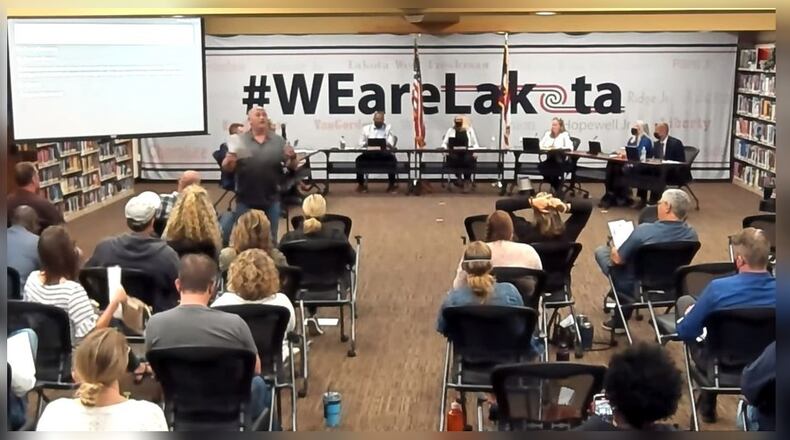On Sept. 27, Brian Oswald planned to speak about Lakota’s mask mandate, but instead of addressing the board, he turned and addressed the parents and attendees in the audience. He was cut off three times by school board president Kelley Casper, who issued two warnings for him to address the board. After the third time he failed to address the board, Casper asked a deputy sheriff to remove Oswald from the room.
“You have forfeited your time because you did not follow what our policies are. I read the policies, the policy states, you have to address the board, not the parents,” Casper said.
Oswald attempted to speak against Lakota’s mask mandate, which several others in attendance did while addressing the board. This incident was two weeks before GOP U.S. Senate candidate Josh Mandel attempted to speak at the Oct. 11 Lakota board meeting but was not allowed as he was not a district resident nor a designee of a resident. He was also asked to leave.
Before he was escorted out, Sullivan told the board, “I’m being reprimanded and my freedom of speech is being violated right now under New York (Times) vs. (Montgomery Police Chief L.B.) Sullivan. This is on a recorded line. You will speak to a lawyer.”
In the 1964 U.S. Supreme Court ruling Oswald referenced, Sullivan sued the New York Times over an advertisement in the newspaper that contained inaccurate information. SCOTUS ruled in favor of the Times, saying criticism of the government and public officials, even if it contained errors, was core to freedom of speech and freedom of the press.
On Monday, Oswald filed a federal lawsuit against the board claiming his freedom of speech was violated, as well as defamation. His attorney, Bradley Kraemer, of West Chester Twp., declined comment at this time.
According to the lawsuit, among Oswald’s allegations, he claims the Lakota School Board violated his First and Fourteenth Amendment rights and he is seeking $500,000. He also wants the board to not restrain his speech in the future, nor deny his ability to contact, petition or access school officials or employees.
He is also seeking attorney fees, court costs and expenses associated with litigation.
It is the second time this year the governing board of Butler County’s largest school system has been the target of a lawsuit regarding its conduct.
In May, a local judge approved a settlement in a lawsuit against Lakota school officials finding the district’s school board violated state public meeting laws during the previous two years.
The lawsuit, which was filed in Butler County Common Pleas Court in March by a Lakota school parent, accused the board of violating Ohio laws governing public meetings and records of such gatherings.
While there is a presumption of a right to speak at public business meetings of governing bodies, like school boards ― and governing bodies do allocate time for public comment ― state and federal law doesn’t provide a right to do so.
Ohio Attorney General David Yost’s office specifies that “nothing in Ohio law affords the public the right to make comments, pose questions or otherwise speak at a meeting of a public body.” The Ohio AG’s office says that public bodies do give in-person attendees an opportunity to speak, but “usually under reasonable, defined and uniform limitations.”
And according to a 1984 U.S. Supreme Court ruling, “The Constitution does not grant to members of the public generally a right to be heard by public bodies making decisions of policy.”
Oswald, in the lawsuit, claims the school board “continues to fabricate rules in order to frustrate and chill speech, and states the “rules do not prohibit participants from addressing the audience while speaking.” The school’s public participation policy, 0169.1 Section F, however, states, “All statements shall be directed to the presiding officer.”
The policy was also stated before the first of two public comment sections during the Sept. 27 meeting, according to the meeting video.
School spokeswoman Betsy Fuller said the board’s attorneys are reviewing the lawsuit and said “the allegations in the complaint are a gross mischaracterization of what actually happened at the Sept. 27 board meeting and they will be dealt with accordingly in court.”
“The COVID-19 pandemic has forced districts across the country to make difficult decisions as students return to the classroom,” she said. “Understandably, this has led to significant and, at times, heated debates in communities. Lakota has not been immune from that. But the board’s top priority has been, and will always be, the safety of Lakota students and staff.”
Fuller also said the district allows public comments at the beginning and end of meetings, but “the board has a policy that sets forth rules that must be met in order for district residents to speak.”
The defamation claim stems from the school board sending a complaint by the school board to the Butler County Sheriff’s Office pertaining to his conduct at the school board meeting. Oswald said the sheriff’s office has initiated an internal affairs investigation.
Butler County Sheriff Richard Jones did not offer a comment about this complaint or investigation.
About the Author

